Part 1 - Local Voice in Home Assistant core
Voice in Home Assistant
I’m using the ESP32-S3-BOX-3B microphone.Home assistant docker version 2024.10 on a dedicated x64 PC.
Install SpeechRecognition
Table of Contents
- Quick start
- Step 0.connect your hardware to home assistant
- Step 1. we need to install Whisper and Piper as docker containers.
- Step 2.Run Whisper, Piper, and OpenWakeWord on external server -> external voice services
- Step 3.Connect it to home assistant core via wyoming integration -> connects external voice services to Home Assistant.
- Step 4.Exposing your devices to Assist.
- How it work
- How These Work Together in voice assistant
- step by step
- Additional info -
- Additional info -Install Option
- How to improve voice recognition
If you want an offline voice assistant in HomeAssistant, you would usually install the wyoming-whisper, wyoming-piper and wyoming-openwakeword addons.
Since on RPI HomeAssistant runs in a container rather than directly on a host, you can’t install addons inside of HA. Instead you have to run these service somewhere else and then connect them to HA over the network.
Let me tell a bit more about my journey so far…
I have Home Assistant docker set up on rpi hardware
I have Home Assistant Voice Assistant ESP32-S3-BOX-3B set up
I have whisper and piper set up on a on Separate Server.
How do I tell Home Assistant to make use of whisper and piper on that other server?
To get started, you'll need to have already set up an ip and port using wyoming integration.
Connecting to your vacuum is performed in two steps:
Connect to the wyoming-whisper API to Home Assistant docker via wyoming integration.
It should ask you for a host and a port now. Enter the IP address of your device into the host-field and enter port in the port-field.
Once the session has started the wyoming-whisper will fire a ready event. At this point you can request information from your Home Assistant or send actions to it.
Wyoming - name of protocol. Accordingly, all components are added to the Wyoming integration with this name.
The wyoming protocol consists of three primary components:
So I tried to do that by creating 3 custom service from those images:
docker image of the Whisper, Piper, and OpenWakeWord
https://hub.docker.com/r/rhasspy/wyoming-whisper
https://hub.docker.com/r/rhasspy/wyoming-piper
https://hub.docker.com/r/rhasspy/wyoming-openwakeword
which is working fine and I can successfully add them to HomeAssistant using the Wyoming-Protocol Integration.
I’m using the ESP32-S3-BOX-3B microphone .Rhasspy’s wyoming-piper and wyoming-faster-whisper can be installed in several different ways. The easiest way is with Docker, which will pull a 0.3-0.8GB image.
This is the entire solution if you are interested.
With the Android application, I do get push notifications when a person is detected by AI
Conversation agent:Home Assistant
Speech-to-text:wyoming-faster-whisper
Text-to-speech:wyoming-piper
WakeWord: On device
I have flashed my ESP32-S3-BOX-3B with an offcial firmware . I believe this is the same situation like you. The ESP32-S3-BOX-3B will act as a voice satelite. Here are what I have:
Hardware
I’ve used the following components for my Voice assistant:
Home Assistant running on a Raspberry 3B+
Whisper, Piper, and OpenWakeWord container runing on a vps on vultr
A voice assistant needs hardware.such as ESP32-S3-BOX3B,Home Assistant Voice Preview Edition
Software
Docker containers:
homeassistant container
Whisper, Piper, and OpenWakeWord container
Esphome container
Intergrations:
wyoming integration
connect to the Whisper, Piper, and OpenWakeWord container
esphome integration
Quick start
Here are the steps I took in order to get this to work:
Step 0.connect your hardware to home assistant
Follow this guide
Step 1. we need to install Whisper and Piper as docker containers.
Open xshell and run the following command:
Install wyoming-piper and wyoming-faster-whisper
Step 2.Run Whisper, Piper, and OpenWakeWord on external server -> external voice services
On a separate machine using one of the following backends:
Run a single-container speech-to-text service on Docker
Run a single-container text-to-speech service on Docker
Step 3.Connect it to home assistant core via wyoming integration -> connects external voice services to Home Assistant.
Open Home Assistant go to Settings → Integrations → Add Integration → Wyoming Protocol
It should ask you for a host and a port now. Enter the IP address of your device into the host-field and enter port in the port-field.
If you install Piper and Whisper as docker containers, you need to set the Host to the IP of the machine running the container, and then Port to 10200 (or whatever you have set for Piper) to add Piper. Then repeat the operation but setting Port to 10300 for Whisper. Mine looks like this:
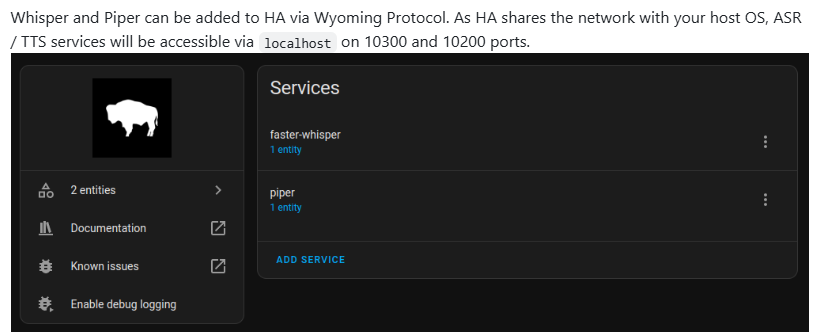
Step 4.Exposing your devices to Assist.
Control HA with your voice without any cloud integration
I am running Home Assistant Core using the docker container, Is there any way that we HA-core peasants to run the add-ons for Whisper and Piper?
I have been using Raspberry Pi Zero, 3A and 3B models with Rhasspy as voice assistant satellites, and decided now is the time to swap to HA Voice Assist.
https://github.com/rhasspy/piper
or
https://github.com/rhasspy/wyoming-faster-whisper
https://github.com/rhasspy/wyoming-piper
The easier way is to use official docker image and you can run it on another host if you want, just specify the right IP address and ports when you will configure the integrations.
Im running Home Assistant in a Docker container behind a reverse proxy. I’ve installed external Piper and Whisper containers (rhasspy/wyoming-whisper, rhasspy/wyoming-piper) and connected them through up the wyoming protocol integration.
Outline:
Verify your OS settings
Install Docker on guest system
Install Whisper and Piper on guest system
Install Whisper and Piper integration on host system
Pass the Whisper and Piper from the guest system
Part 1 - Local Voice in Home Assistant core
https://blog.matterxiaomi.com/blog/voice-homeassistant/
Part 2 - Run whisper on external server
https://blog.matterxiaomi.com/blog/run-whisper-on-external-server/
Part 3 - Run piper on external server
https://blog.matterxiaomi.com/blog/run-piper-on-external-server/
Part 4 - Run wakeword on external server
https://blog.matterxiaomi.com/blog/run-wakeword-on-external-server/
How it work
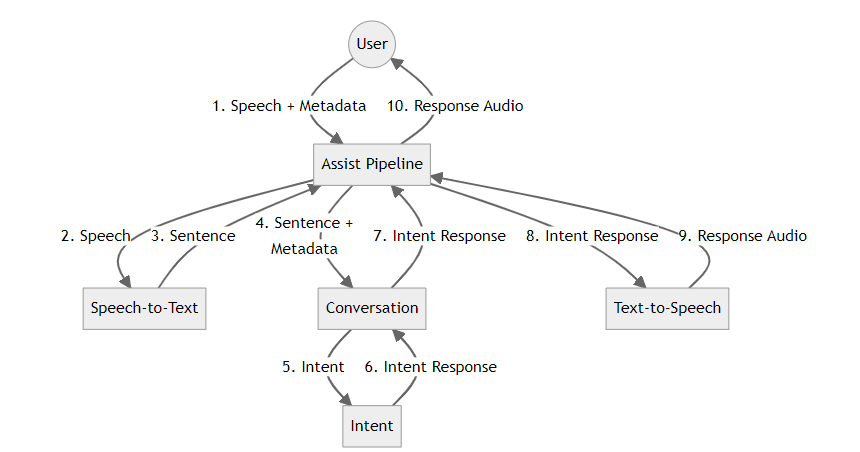
1. Assist Hardware
Home assistant voice PE(esphome integration)
Wait for voice
wakeword detection
a ESP32 with I2S Mic using ESPHome and successfully detect wakeword.
if any human voice is detected, start recording, then with slience stopped.
Save audio to file
2.Speech to Text
whisper ,Used to turn audio into text.
Assist Hardware Passing(streaming) the wav audio data to stt.
After it, performs Speech to Text.
3.
4.intent recognition and intent execution
Speech Processing
8.text to speech
9.Used to play audio files
Speech Processing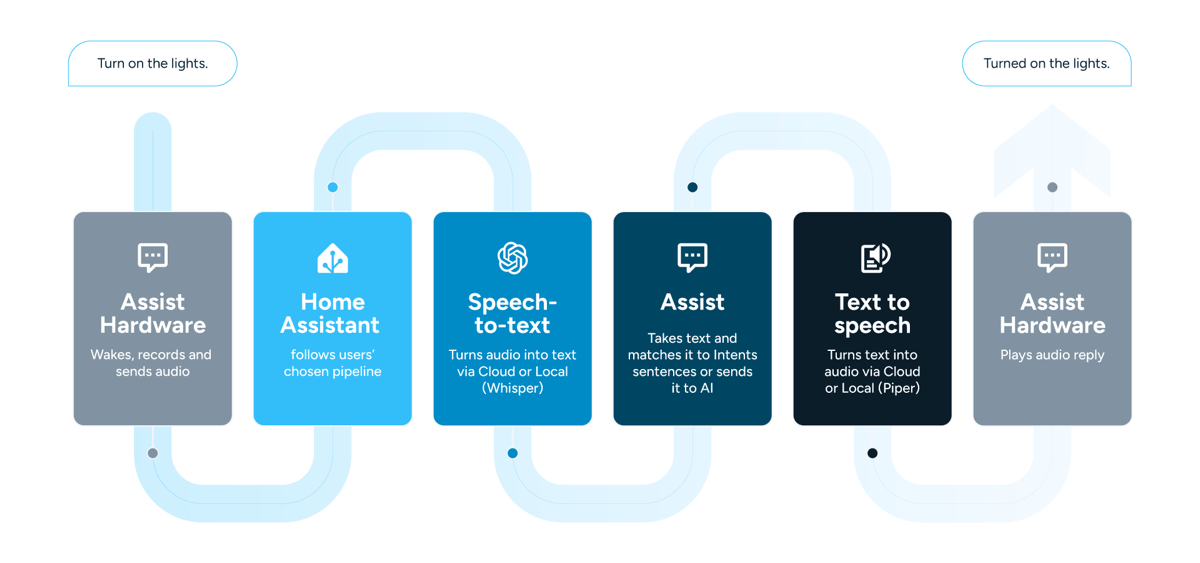
https://www.home-assistant.io/images/blog/2024-12-voice-chapter-8/voice-pipeline.png
source:https://www.home-assistant.io/blog/2024/12/19/voice-chapter-8-assist-in-the-home/
conversation(会话组件)
会话组件允许您与Home Assistant交谈。
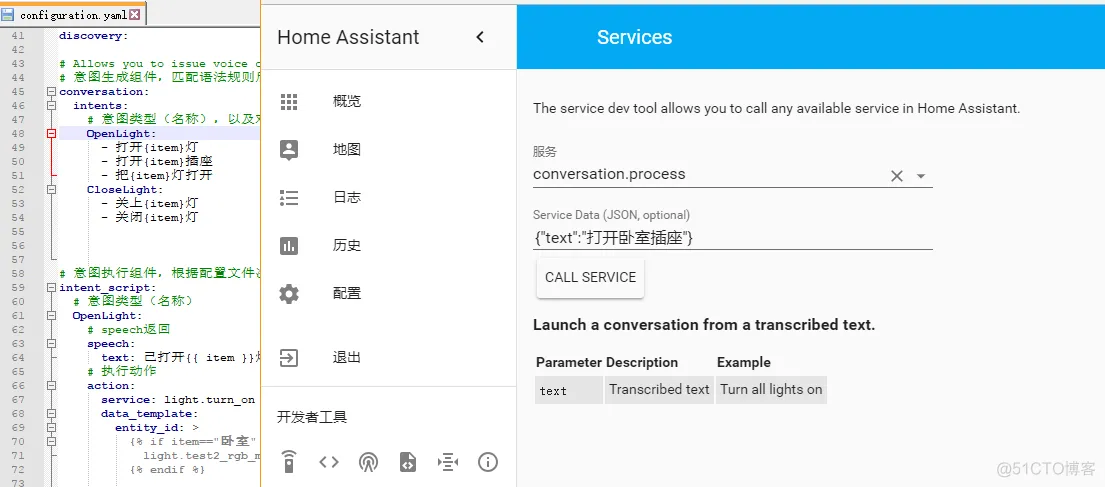
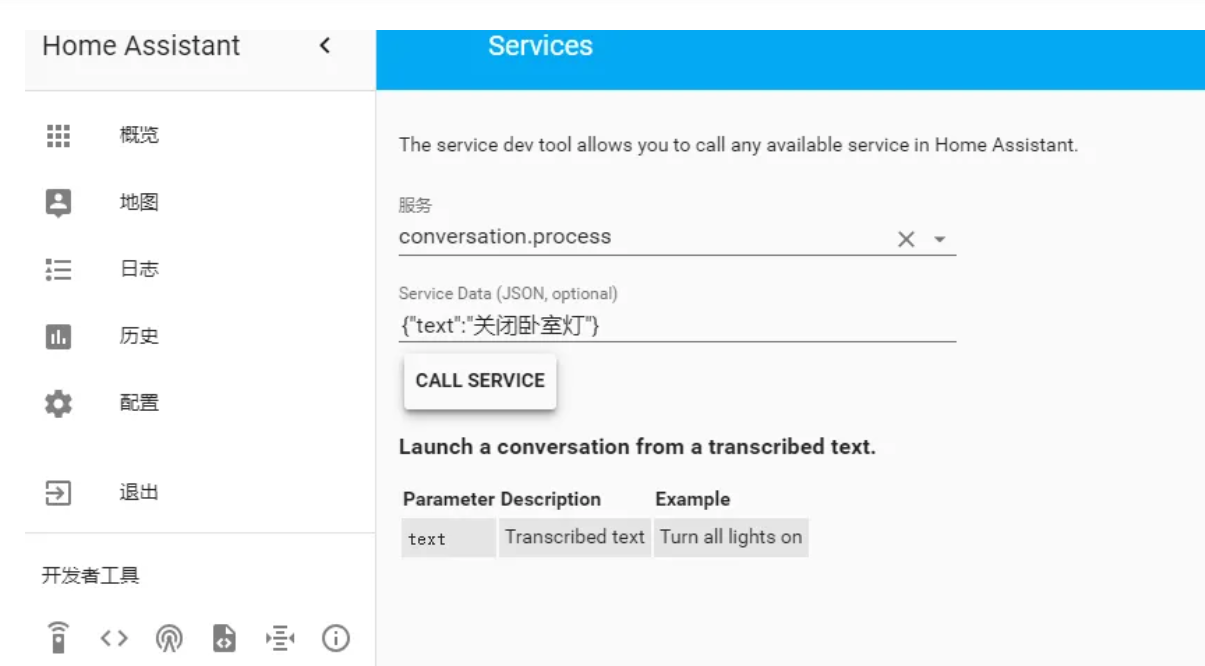
How These Work Together in voice assistant
step 1.connect these to home assistant
step 2. voice assistant via piper
step 3.use one of voice assistants
step 4.voice assistant - Putting everything together.
step by step
step 1.Run Whisper, Piper, and OpenWakeWord on external server
Run Whisper, Piper, and OpenWakeWord with Docker.Pull the container,change path to your path and run it.
step 2.Connect it to home assistant core via wyoming integration
Just use the ha core and setup the wyoming integration. For host I selected localhost and for port pointed at port10200 and 10300
Whisper and piper arre recognized in home assistant.
The Wyoming integration connects external voice services to Home Assistant using a small protocol.
http://localhost:4999/boards/topic/14594/voice-in-home-assistant#22634
Note
Note that these images are only supported on 64bit architectures
I’ve tries with Raspberry 3B+ and Raspberry OS (32bit) and seems images are only for ARM64.I can not pulling on a rpi3 b+ because it cannot find the arm version.
The issue is that the standard rpi OS is in 32 bit and the images for piper and whisper are 64 bit.
https://www.matterxiaomi.com/boards/topic/15742/local-voice-functionality-in-home-assistant-corehow-to-manually-install-piper-and-whisper-on-home-as#22675
Additional info -
mkdir /root/whisper-data# Piper
docker run -d -p 10200:10200 \
-v /root/piper-data:/data \
--restart unless-stopped \
rhasspy/wyoming-piper \
--voice en_US-lessac-medium
# Whisper
docker run -d -p 10300:10300 \
-v /root/whisper-data:/data \
--restart unless-stopped \
rhasspy/wyoming-whisper \
--model tiny-int8 --language en
# openWakeWord
docker run -d -p 10400:10400 \
--restart unless-stopped \
rhasspy/wyoming-openwakeword \
--preload-model 'ok_nabu'
Additional info -Install Option
Rhasspy’s wyoming-piper and wyoming-faster-whisper can be installed in several different ways. The easiest way is with Docker, which will pull a 0.3-0.8GB image
When install piper in your network you have three options
Option 1.Install wyoming-piper and wyoming-faster-whisper locally with Python virtual environment detail
pip install git+https://github.com/openai/whisper.git Option 2.Install piper locally (and also whisper), with docker detail
Install piper locally (and also whisper), with add-on detail
Option 3.build from source detail
How to improve voice recognition
1.You have to change the model itself
The bigger the model, the better the recognition, however more resources are required and it may take longer to respond.
After I changed from Tiny to Medium, for example Chinese is sooo much better recognized
Useful links
source:https://developers.home-assistant.io/docs/voice/overview/
https://community.home-assistant.io/t/how-to-manually-install-piper/568040
https://www.home-assistant.io/blog/2024/06/26/voice-chapter-7/
https://github.com/rhasspy/wyoming-addons
Comments
Comments are closed